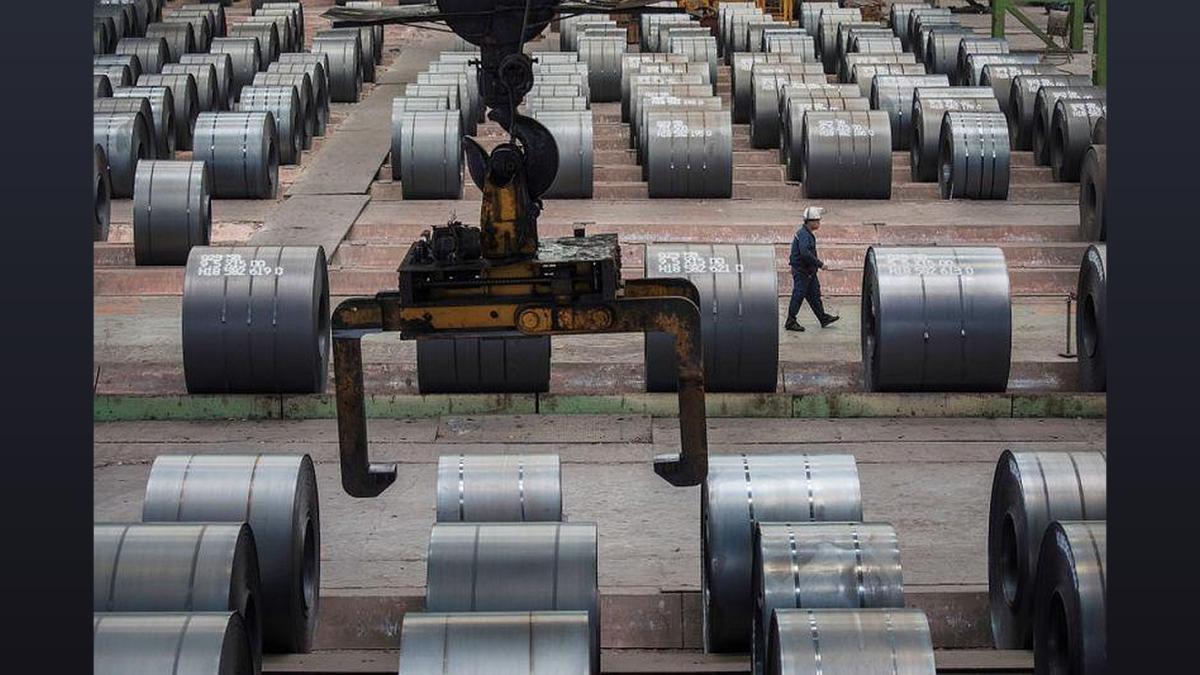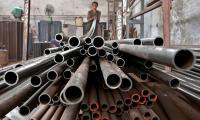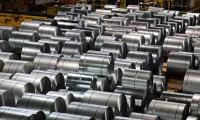Germany's Low Emission Steel Standard: Challenges for Indian Industry
Germany's proposed Low Emission Steel Standard (LESS) poses challenges for Indian steel industry, potentially impacting exports due to stricter carbon emission standards. Learn more about LESS and its implications for India's steel sector.

New Delhi, Aug 9 (PTI) Germany's proposed Low Emission Steel Standard (LESS) is expected to pose new challenges to Indian industry which is already reeling with lower exports, higher imports and Europe's carbon tax, think tank GTRI said on Friday.
India's steel exports have dropped by 31.2 per cent from USD 31.7 billion in 2021-22 to USD 21.8 billion in 2023-24, while imports have increased by 37 per cent, from USD 17.3 billion to USD 23.7 billion, making India a net importer, it said.
The Global Trade Research Initiative (GTRI) said that the Indian steel industry is not legally bound to follow the new German steel standard, but ignoring it could hurt domestic exports.
"Global markets are demanding low-carbon products, and Indian steel producers not aligning with LESS may struggle to compete," GTRI Founder Ajay Srivastava said.
He added that India's steel industry must prepare to comply with new steel standards introduced by Germany, but may soon be adopted by other developed countries.
LESS is a voluntary labelling programme that classifies steel based on the carbon dioxide emissions released during the pre-production and production stages of steel.
It is the latest in a series of measures by many countries to cut emissions in steel making through the use of better technology and greener energy sources. The European Union's CBAM (carbon border adjustment mechanism) or carbon tax is one such measure.
These measures assume significance as the steel industry accounts for 7 per cent of global carbon dioxide
(CO2) emissions, highlighting the importance of decarbonising the steel sector.
GTRI said that LESS is developed by the German Steel Federation (WV Stahl) and the Federal Ministry of Economics and Climate Protection (BMWK) and is set to be introduced in late 2024.
LESS categorises steel products into five classes based on their carbon footprint and scrap content, ranging from ultra-low emission Class A to high emission Class E. Category A has the least CO2 emissions, while Category E has the most, with B, C, and D in between.
"This could pose challenges for Indian steel producers, as much of their steel is likely to be categorised in the lower three grades (C, D, and E).
"This categorisation might lead buyers to easily identify and avoid purchasing from these companies, potentially causing more harm than the CBAM tax on high-carbon steel," it said.
It added that unlike CBAM, which is complicated and doesn't clearly label firms, LESS creates a perception problem for Indian firms.
"A list showing companies and their steel categories may soon be available, potentially affecting their ability to secure orders from developed countries," it said.
It said that manufacturers have to report their scrap content and product carbon footprint, which are verified by independent third parties for certification.
LESS applies to the entire steel industry, including traditional blast furnace production and newer methods like hydrogen and electric arc furnace production.
It added that it is a German initiative that supports global efforts to reduce steel industry emissions. Countries in Europe, Asia, and North America are already working on low-carbon steel production through various policies.
"While both the CBAM and LESS aim to reduce carbon emissions, they work differently. CBAM makes foreign firms pay carbon costs at the EU's border, whereas LESS is a voluntary labelling program. CBAM allows trade in high-emission steel, but countries adopting LESS might ban or restrict imports of high-emission steel," Srivastava said.
He added that Indian steel producers and the government must take strategic steps to align with these new standards to keep the domestic steel industry competitive in the evolving global market.
The GTRI suggested the industry invest in low-carbon technologies that reduce carbon emissions, such as electric arc furnaces, hydrogen-based steelmaking, and carbon capture and storage to deal with these issues.
The domestic players should also conduct comprehensive carbon footprint assessments to identify reduction opportunities is another important step.
To the government, the think tank recommended playing a pivotal role in supporting the transition to low-carbon steel production through several measures.
The government should develop clear and supportive policies to encourage low-carbon steel production, such as tax incentives, PLI, and research funding.
"Additionally, investing in infrastructure to support the transition, such as renewable energy sources and efficient transportation networks, is essential. Aligning national standards with LESS will facilitate trade and ensure product quality, it added.
India's steel industry mainly uses the blast furnace-oxygen steelmaking (BF-BOS) method, which has a higher carbon footprint than electric arc furnaces (EAFs). Switching to low-carbon steel production will need significant investment in new technologies and infrastructure.
South Korea remains India's largest steel supplier, but imports from China and Vietnam have seen significant growth.
The CBAM or carbon tax (a kind of import duty) will come into effect from January 1, 2026, but from October 1 this year, domestic companies from seven carbon-intensive sectors, including steel, cement, fertiliser, aluminium and hydrocarbon products, have to share data with regard to carbon emissions with the EU.
India's steel exports have dropped by 31.2 per cent from USD 31.7 billion in 2021-22 to USD 21.8 billion in 2023-24, while imports have increased by 37 per cent, from USD 17.3 billion to USD 23.7 billion, making India a net importer, it said.
The Global Trade Research Initiative (GTRI) said that the Indian steel industry is not legally bound to follow the new German steel standard, but ignoring it could hurt domestic exports.
"Global markets are demanding low-carbon products, and Indian steel producers not aligning with LESS may struggle to compete," GTRI Founder Ajay Srivastava said.
He added that India's steel industry must prepare to comply with new steel standards introduced by Germany, but may soon be adopted by other developed countries.
LESS is a voluntary labelling programme that classifies steel based on the carbon dioxide emissions released during the pre-production and production stages of steel.
It is the latest in a series of measures by many countries to cut emissions in steel making through the use of better technology and greener energy sources. The European Union's CBAM (carbon border adjustment mechanism) or carbon tax is one such measure.
These measures assume significance as the steel industry accounts for 7 per cent of global carbon dioxide
(CO2) emissions, highlighting the importance of decarbonising the steel sector.
GTRI said that LESS is developed by the German Steel Federation (WV Stahl) and the Federal Ministry of Economics and Climate Protection (BMWK) and is set to be introduced in late 2024.
LESS categorises steel products into five classes based on their carbon footprint and scrap content, ranging from ultra-low emission Class A to high emission Class E. Category A has the least CO2 emissions, while Category E has the most, with B, C, and D in between.
"This could pose challenges for Indian steel producers, as much of their steel is likely to be categorised in the lower three grades (C, D, and E).
"This categorisation might lead buyers to easily identify and avoid purchasing from these companies, potentially causing more harm than the CBAM tax on high-carbon steel," it said.
It added that unlike CBAM, which is complicated and doesn't clearly label firms, LESS creates a perception problem for Indian firms.
"A list showing companies and their steel categories may soon be available, potentially affecting their ability to secure orders from developed countries," it said.
It said that manufacturers have to report their scrap content and product carbon footprint, which are verified by independent third parties for certification.
LESS applies to the entire steel industry, including traditional blast furnace production and newer methods like hydrogen and electric arc furnace production.
It added that it is a German initiative that supports global efforts to reduce steel industry emissions. Countries in Europe, Asia, and North America are already working on low-carbon steel production through various policies.
"While both the CBAM and LESS aim to reduce carbon emissions, they work differently. CBAM makes foreign firms pay carbon costs at the EU's border, whereas LESS is a voluntary labelling program. CBAM allows trade in high-emission steel, but countries adopting LESS might ban or restrict imports of high-emission steel," Srivastava said.
He added that Indian steel producers and the government must take strategic steps to align with these new standards to keep the domestic steel industry competitive in the evolving global market.
The GTRI suggested the industry invest in low-carbon technologies that reduce carbon emissions, such as electric arc furnaces, hydrogen-based steelmaking, and carbon capture and storage to deal with these issues.
The domestic players should also conduct comprehensive carbon footprint assessments to identify reduction opportunities is another important step.
To the government, the think tank recommended playing a pivotal role in supporting the transition to low-carbon steel production through several measures.
The government should develop clear and supportive policies to encourage low-carbon steel production, such as tax incentives, PLI, and research funding.
"Additionally, investing in infrastructure to support the transition, such as renewable energy sources and efficient transportation networks, is essential. Aligning national standards with LESS will facilitate trade and ensure product quality, it added.
India's steel industry mainly uses the blast furnace-oxygen steelmaking (BF-BOS) method, which has a higher carbon footprint than electric arc furnaces (EAFs). Switching to low-carbon steel production will need significant investment in new technologies and infrastructure.
South Korea remains India's largest steel supplier, but imports from China and Vietnam have seen significant growth.
The CBAM or carbon tax (a kind of import duty) will come into effect from January 1, 2026, but from October 1 this year, domestic companies from seven carbon-intensive sectors, including steel, cement, fertiliser, aluminium and hydrocarbon products, have to share data with regard to carbon emissions with the EU.
You May Like To Read
TODAY'S MOST TRADED COMPANIES
- Company Name
- Price
- Volume
- Vodafone Idea L
- 6.96 ( -1.69)
- 32087619
- Spicejet Ltd.
- 45.48 ( -6.38)
- 24487576
- Srestha Finvest
- 0.56 (+ 3.70)
- 15767473
- G G Engineering
- 1.00 ( 0.00)
- 13488004
- YES Bank Ltd.
- 16.20 (+ 0.31)
- 11982994






 © 2025 Rediff.com India Limited. All rights reserved.
© 2025 Rediff.com India Limited. All rights reserved.